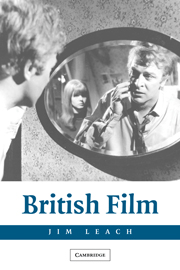Book contents
- Frontmatter
- Contents
- Acknowledgments
- Introduction
- 1 The National Health: Great Britain/Deep England
- 2 The Magic Box: What Is British Cinema?
- 3 The Common Touch: The Art of Being Realistic
- 4 The Mirror Crack'd: British Expressionism
- 5 Millions like Us: National Cinema as Popular Cinema
- 6 The Stars Look Down: Acting British
- 7 No Sex Please – We're British: Sex, Gender, and the National Character
- 8 Carry On Regardless: The British Sense of Humor
- 9 Sexy Beasts: British Monsters
- 10 The Ruling Class: Ideology and the School Movie
- 11 The Long Memory: History and Heritage
- 12 I'm British but … : Empire and After
- Notes
- Bibliography
- Filmography
- Index
9 - Sexy Beasts: British Monsters
Published online by Cambridge University Press: 07 May 2010
- Frontmatter
- Contents
- Acknowledgments
- Introduction
- 1 The National Health: Great Britain/Deep England
- 2 The Magic Box: What Is British Cinema?
- 3 The Common Touch: The Art of Being Realistic
- 4 The Mirror Crack'd: British Expressionism
- 5 Millions like Us: National Cinema as Popular Cinema
- 6 The Stars Look Down: Acting British
- 7 No Sex Please – We're British: Sex, Gender, and the National Character
- 8 Carry On Regardless: The British Sense of Humor
- 9 Sexy Beasts: British Monsters
- 10 The Ruling Class: Ideology and the School Movie
- 11 The Long Memory: History and Heritage
- 12 I'm British but … : Empire and After
- Notes
- Bibliography
- Filmography
- Index
Summary
Although the revival of British cinema during and after World War II led many critics to celebrate a new “cinema of quality,” there were also trends that seemed disturbing to some observers. In 1948 Harold Wilson who, as president of the Board of Trade in the Labour government, was responsible for the film industry, declared, “we are getting tired of some of the gangster, sadistic and psychological films of which we seem to have so many, of diseased minds, schizophrenia, amnesia and diseases which occupy so much of our screen time.” He wanted “to see more films which genuinely show our way of life” and refused to believe that “amnesia and schizophrenia are stock parts of our social life.”
As a staunch realist, Wilson here conflates two meanings of “normality,” as what is common and typical and what is healthy and reasonable. His argument also depends on making clear distinctions between so-called normal states of mind and what Charles Barr calls “the darker forces” at work in the genre films to which Wilson refers. However, the sheer number of these films and the intensity of Wilson's denunciation of them suggest that they did appeal to fairly large audiences, and thus that “our way of life” was not as stable or as homogeneous as Wilson imagined.
The continuing influence of the myth of the People's War and the social policies of the postwar Labour government stressed the need for collective action in the common interest, but according to Robert Murphy, this vision was “more than counter-balanced by the new opportunities for crime that the war opened up.”
- Type
- Chapter
- Information
- British Film , pp. 161 - 181Publisher: Cambridge University PressPrint publication year: 2004



